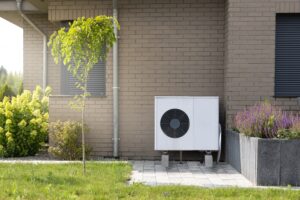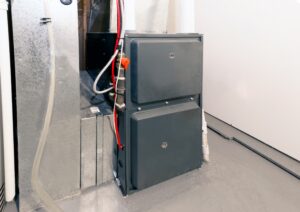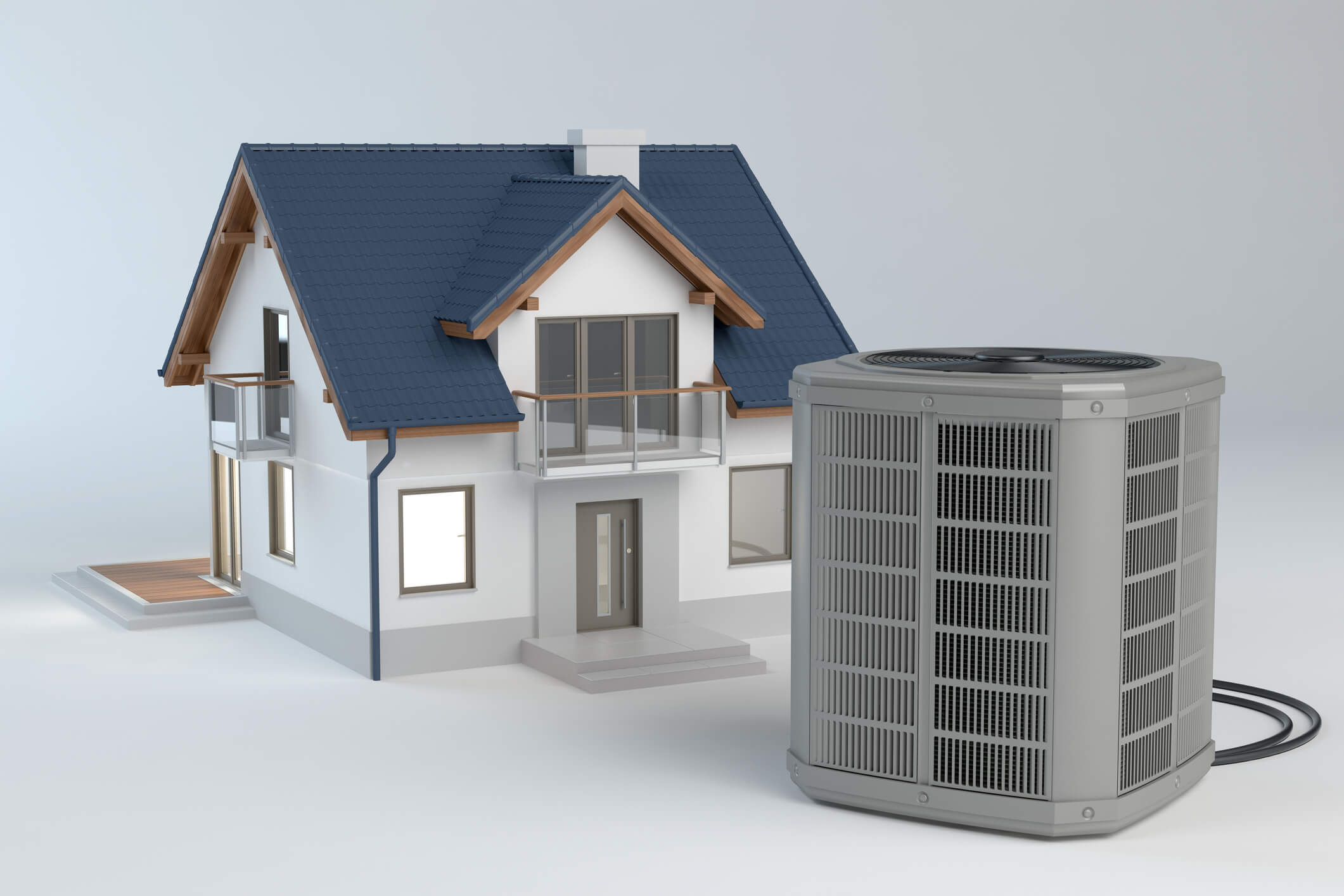As heat pumps become more advanced and increasingly popular, many homeowners consider the benefits of choosing a traditional furnace vs. a heat pump. Both options heat your home, but they work in different ways and have respective impacts on comfort, energy efficiency, and long-term costs. Switching from gas heat to electric heat pumps involves considering key differences, costs, and other factors to determine the ideal system for your home.

How Do Heat Pumps and Furnaces Work?
Both heat pumps and furnaces warm your home, but they function differently.
Furnaces
A furnace uses natural gas, oil, or propane to produce heat through combustion or electricity to provide electric resistance heating. The system’s blower fan pushes hot air through ductwork to distribute it throughout your home.
Heat Pumps
Unlike a furnace, a heat pump transfers heat rather than generates it. Equipped with similar technology as air conditioners, a heat pump in heating mode uses refrigerant and a compressor to extract heat from outside and transfer it indoors. In the summer, its reversing valve switches it to cooling mode and reverses the heat exchange process, drawing heat from inside your home and moving it outside. This dual function allows a heat pump to serve as both a heating and cooling system.
Heat pumps feature an indoor air handler and outdoor compressor unit and are compatible with ductwork. However, some heat pumps operate without ductwork. Ductless systems, or mini-split systems, have multiple indoor air handlers and a single outdoor unit.
Key Benefits of Switching to a Heat Pump
Switching from gas heat to electric with a heat pump provides several advantages.
One System for Heating and Cooling
A heat pump provides both heating and cooling, eliminating the need for a separate furnace and AC in most cases. This dual functionality simplifies heat pump maintenance and provides a versatile year-round solution.
High Energy Efficiency Ratings
Heat pumps offer significant energy efficiency improvements over furnaces and other heating options. Most modern heat pumps have high seasonal energy efficiency ratio (SEER) and heating seasonal performance factor 2 (HSPF2) ratings, which indicate energy-efficient system performance in various climates.
Although heat pump installation costs may be higher than a furnace, lower energy and operating costs often make up the long-term difference. Because heat pumps use electricity, they’re generally more cost-effective in regions where electricity rates are similar to or lower than natural gas prices.
Eco-friendly
Electric-based heat pumps help offset your carbon footprint as electricity grids become more efficient. Heat pumps result in fewer overall emissions for most homes, often between 40% and 75% less than gas furnaces.
Enhanced Home Comfort
Heat pumps provide consistent, even, and comfortable indoor temperatures, typically running in longer and steadier cycles than furnaces. This continuous operation, facilitated by advanced modulating features — or the ability to adjust capacity to match heating or cooling needs automatically — prevents hot and cold spots throughout your home.
Rebate and Incentive Eligibility
Many homeowners are eligible for rebates, tax credits, and other incentives when switching to a heat pump. Federal or state-level government programs and local utility companies offer programs designed to incentivize greener home upgrades by offsetting some upfront installation costs. In California, for example, single-family homeowners may qualify for up to $8,000 for heat pump installation through the Home Electrification and Appliance Rebate program.

Heat Pump vs. Furnace: Which Is More Efficient?
Heat pumps are highly efficient and often outperform furnaces, especially in moderate climates. However, furnaces are sometimes more effective, depending on local climate, energy or fuel rates, and other factors.
With refrigerant-based heating, heat pumps absorb heat from the outdoor air, achieving efficiency ratings well beyond 100%, often delivering between two to four times more heat energy than their electrical energy consumption. In comparison, the most energy-efficient furnaces achieve about 98% efficiency. Several advanced technologies enable high heat pump efficiency, including:
- Dual or variable-speed fans: Many heat pumps feature variable-speed or dual-speed motors for indoor and outdoor fans, maintaining a consistent airflow and maximizing energy savings.
- Staged or multi-speed compressors: Multiple compressor stages or speeds let heat pumps dynamically adjust to heating or cooling needs rather than operating at maximum capacity.
- Electronic expansion valves: Compared to thermostatic expansion valves, electronic expansion valves offer more precise refrigerant flow control, allowing faster responses to varying heat or cooling needs.
Despite heat pump efficiency, gas furnaces are still advantageous in cold climates. Gas furnaces retain efficiency even in extreme cold, especially those equipped with advanced components, making them a better standalone in areas prone to prolonged sub-freezing conditions.
Factors Affecting Heat Pump Efficiency
Efficiency ratings provide insight into heat pump performance, but heat pump efficiency also depends on these factors:
- Accurate system sizing
- Ducted vs. ductless
- In ducted systems, proper ductwork design and condition
- Home insulation and air sealing
- Thermostat settings
- Regular maintenance
Can a Heat Pump Work Efficiently in Cold Weather?
Some heat pumps operate optimally in temperatures above 25 to 40 degrees, losing efficiency as temperatures approach or dip below freezing. Many modern heat pumps, however, work efficiently in subzero temperatures and are ideal for mild winters, largely thanks to improvements in compressor technology, refrigerants, and overall system design.
ENERGY STAR-certified heat pumps have verified performance for cold climates, maintaining heating capacity down to 5 degrees and working at as low as -20 degrees. Heat pumps gradually lose efficiency in prolonged cold snaps but remain more energy-efficient than many heating systems.
How Dual-fuel Heating Systems Work
A dual-fuel system may be an ideal option for regions with extreme winter temperatures. Dual-fuel systems pair a heat pump with a backup gas furnace — the heat pump serves as the primary heat source during moderate conditions, and the system switches to the furnace at temperatures below the heat pump’s efficiency threshold. This system ensures uninterrupted warmth and home comfort while minimizing electricity and fuel costs.
Schedule a Consultation for Your Heat Pump Upgrade
Upgrading your home’s heating system is an important decision. Weighing furnace replacement options against a heat pump’s efficiency and cost savings can help inform your choices.
Not sure if a heat pump is worth it? At Monarch, our technicians can assess your home and provide expert recommendations based on typical Bakersfield winters, energy costs, and other factors. Contact us and consult with Monarch’s home experts to explore your heating system options.


